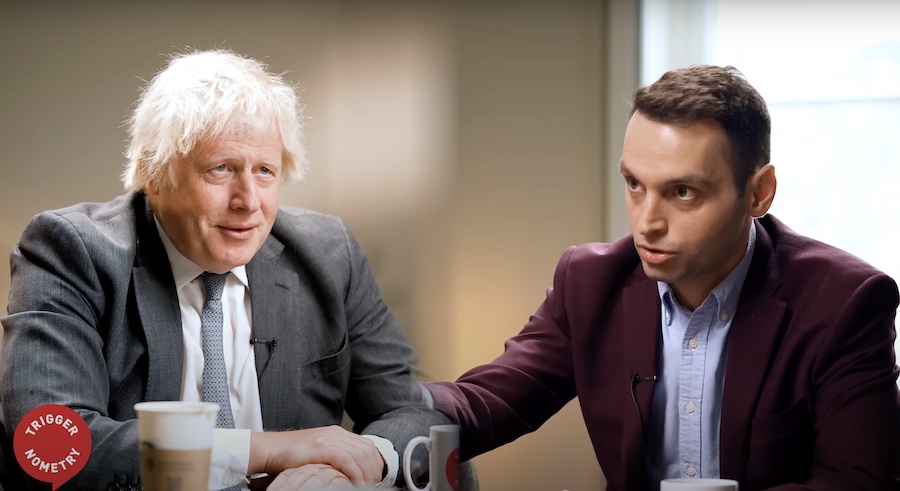Boris Johnson is trying to wash his hands of the unprecedented wave of migration that has seen more than one million people move to the UK in each of the last three years. He was confronted about this ‘Boriswave’ on the Triggernometry podcast yesterday and told the hosts that rather than being the result of his decisions, Covid and the Migration Advisory Committee were to blame. Are his explanations convincing?
First, he said the bounce was due to people leaving the country in the pandemic and returning afterwards: ‘If you look at what actually happened, the numbers go down, we had a huge number of people leave the country because of Covid… You then have a lot of students coming back to complete their courses, who push up the numbers in that so-called wave.’
The ONS’s estimates tell a different story. There’s no large spike in emigration during the pandemic. (Other ONS figures, from the Labour Force Survey, suggest that the foreign-born population of the country fell by a million in the year after the pandemic began.) Net migration did collapse – but the wave that followed dwarfs the reduction. Yes, students left – but the subsequent increase was not just a post-pandemic bounce. It also happened because of the government’s policy to increase international student numbers from 470,000 to 600,000, something it achieved eight years early.
Johnson continued, ‘because we’re talking about 2022, you have a large number of Ukrainians coming in, you have Afghans, you also have Hongkongers’. Schemes for those groups make up about 15 per cent of net migration over the last three years, and taking them out of the net migration figures would only trim the peak from 906,000 to 789,000.
Then, he blamed officials and advisers: ‘What also happened, and this was not government policy but it is something that was driven by the Migration Advisory Committee, you had a panic if you remember, post-Covid, when nobody could get the shelves stacked… nobody was confident that the crops were going to be picked in the fields, and do you remember when the petrol stations couldn’t get fuel? And we were very worried about social care workers, or the officials were. So I think yes, they probably did hand out too many visas for people and their dependents for people to come in under those schemes.’
In 2021 the Migration Advisory Committee said that health and care workers should be eligible for skilled worker visas and put on the shortage occupation list. The government adopted those changes. It doesn’t have to follow the MAC’s advice. It ignored the recommendation to increase care workers’ pay to attract and keep people in the industry, to reduce the need for migration to fill the gap. The MAC was opposed to the graduate work visa, which lets students stay and work for two years after their course finishes, saying that ‘a post-study work regime could become a pre-work study regime’. Priti Patel launched the scheme in 2021. Since then, a net 630,000 students and 225,000 of their dependents have moved to the UK. Johnson’s government did more: When it created the post-Brexit points-based immigration system, it didn’t cap visa numbers for skilled workers and cut the salary threshold from £30,000 to £25,600. Those changes caused the Boriswave, not Covid or advice that could have been listened to but not taken.
In the interview, Johnson said Brexit was a vote to ‘take back control, so that politicians could rightly be held to account for the numbers of people coming in’. But it seems like he doesn’t want to take responsibility.






Comments